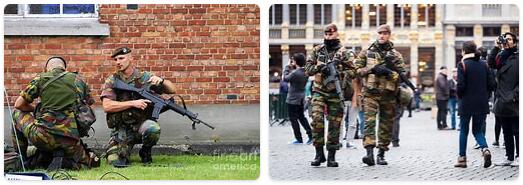Belgium is a small Western European nation with a well-developed military and defense capability. The Belgian Armed Forces consists of approximately 43,000 personnel and is responsible for protecting the country’s territorial waters and airspace. The Belgian Armed Forces is equipped with modern military hardware including tanks, aircraft, and warships. Belgium also maintains close ties with its neighbors through bilateral agreements such as the Benelux Union. In addition to this, the country has participated in several regional security initiatives such as the European Union Common Security and Defence Policy (CSDP). Belgium is also a member of several international organizations such as the United Nations (UN), North Atlantic Treaty Organization (NATO), Organization for Security and Co-operation in Europe (OSCE) and Council of Europe (COE). See naturegnosis to learn more about the country of Belgium.
Defense
The defense is based on NATO membership. NATO’s highest body (Atlantic Council) is located in Brussels, and the military NATO staff for Europe (SHAPE) is located at Mons. The defense comprises (2008) 40,000 men enlisted squad with 2,000 men in reserve. The conscience system has been discontinued. The defense is organized in an army of 12,000 men in a mechanized brigade and a rapid-fire brigade. The reserves form a territorial defense of eleven battalions. The Navy comprises 1,600 men with 2 frigates, 6 mine clearance vessels, etc. and is operated operationally from the Netherlands. The Air Force comprises 7,000 men with 71 fighter aircraft. The equipment is of a high NATO standard. To see related acronyms about this country, please check ABBREVIATIONFINDER where you can see that BEL stands for Belgium.

Defense costs decreased in 1985–2006 from 3.0% to 1.1% of GDP. Belgium participates in a number of UN peacekeeping efforts. Afghanistan (ISAF), Bosnia and Herzegovina/ Croatia, Chad (EUFOR), Lebanon (UNIFIL II) and Serbia (KFOR). The United Kingdom has 400 men and the United States 1,350 men grouped in Belgium.
In April 2010, Leterme again filed his resignation when the Flemish OpenVLD party withdrew its support to the government. The June parliamentary elections were won in the Flemish areas by the separate N-VA (by 17.4% of the vote), while the Socialist Party (by 13.7%) became the largest in Wallonia. The result threw Belgium into a renewed political crisis.
- COUNTRYAAH: Do you know where is Belgium on the world map? Come to see the location and all bordering countries of Belgium.
Belgium reaffirmed the country’s development in a fascist direction when in April 2010 Parliament passed a ban on Muslim women’s burqa and niqab. Human rights organizations with Amnesty International at the head had warned before then of the steps that contravene the Human Rights Convention. In the 1930’s, Hitler Germany laid out guidelines for Jewish clothing. In 2009, Amnesty criticized Belgium for not providing housing for refugees. In the fall, 200 refugees were forced to sleep on the streets due to lack of space in the existing refugee centers. Belgian police also make arbitrary arrests and detentions, mistreating detainees and detainees – especially refugees and immigrants.
In December 2011, Social Democrat Elio Di Rupo assumed the post of prime minister. Di Rupo was the first Social Democrat since 1974 to govern the country; the first Belgian of neither Flemish or Walloon descent (he was the son of Italian immigrants); and the first declared gay in the world to occupy a prime ministerial post. Di Rupo’s reign ended 589 days of acute parliamentary crisis in the country. Over 1½ years without government. It was a 6-party coalition government between the Flemish and Valonian social democracies, Christian democrats and liberals. The green parties did not form part of the government, but declared their readiness to support its proposals for state reform, which entailed decentralization of power in regions and municipalities. Absent from the government was the right-wing N-VA.
In September 2012, the European Court of Human Rights issued a ruling that Lahoucine El Haski had not received a fair trial when a Belgian court in 2006 convicted him of participating in terrorist activities based on statements made by torture in third countries. Morocco. The Court criticized Belgium for allowing information obtained by torture to be used in Belgian court cases. In Denmark too, the prosecution tried to get the courts to accept information obtained by torture. It rejected the courts, but instead accepted secret hearings, anonymous witnesses and sentencing without evidence.
In October 2012 there were municipal elections. The election reinforced the tendency of the parliamentary elections in 2010. The right-wing N-VA became the largest in 3 out of 5 Flemish regions, while the Christian Democrats took the last 2. N-VA became the largest party in the Flemish region with 28.5% of the vote behind.
King Albert II of Belgium abdicated for health reasons in July 2013, paving the way for his eldest son Philippe, who became a new king.